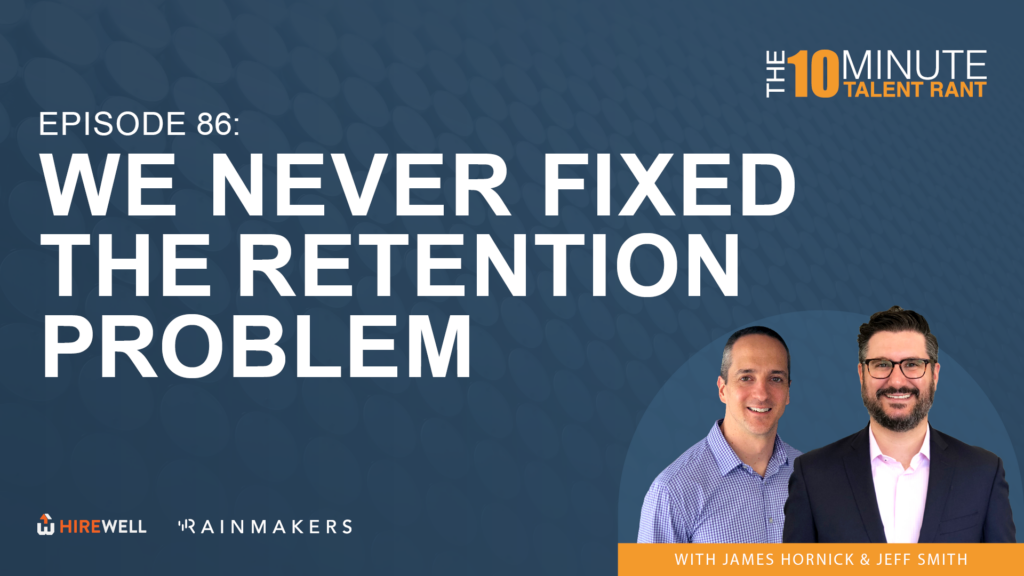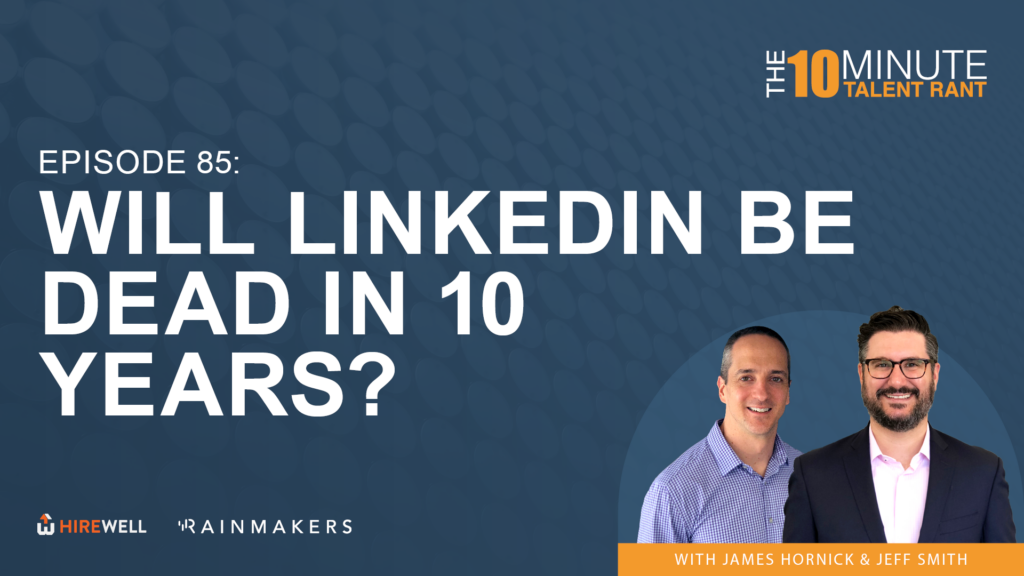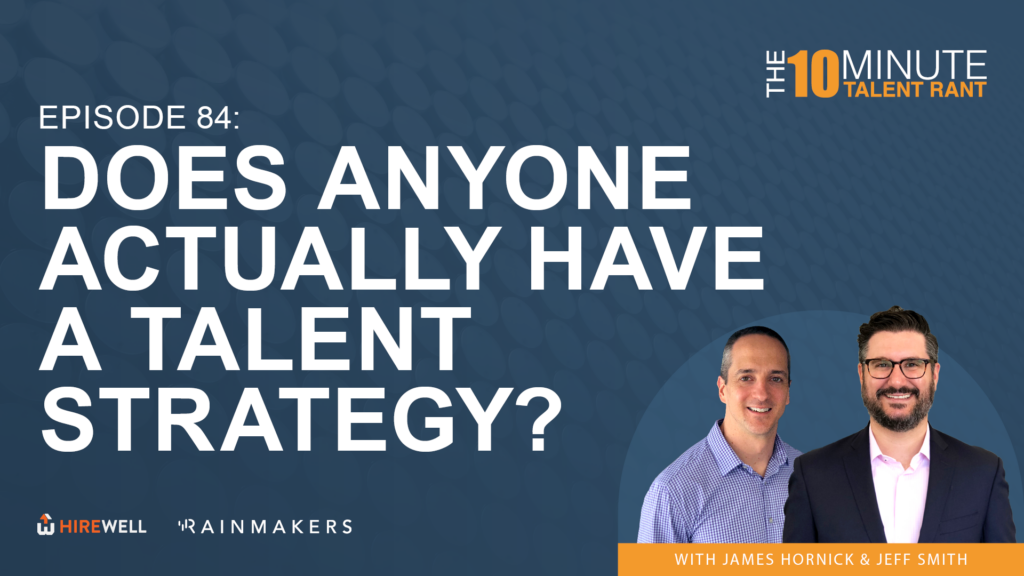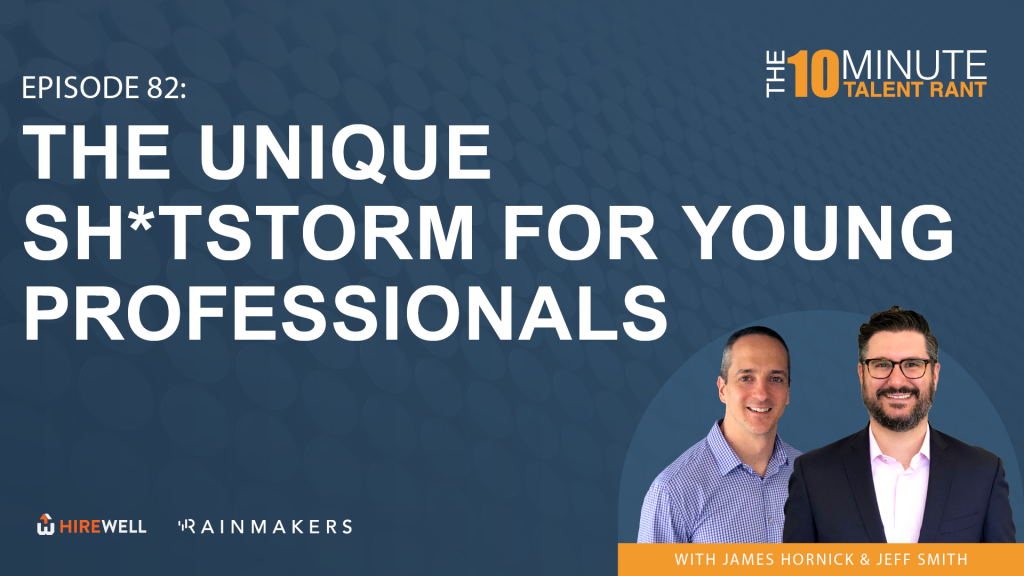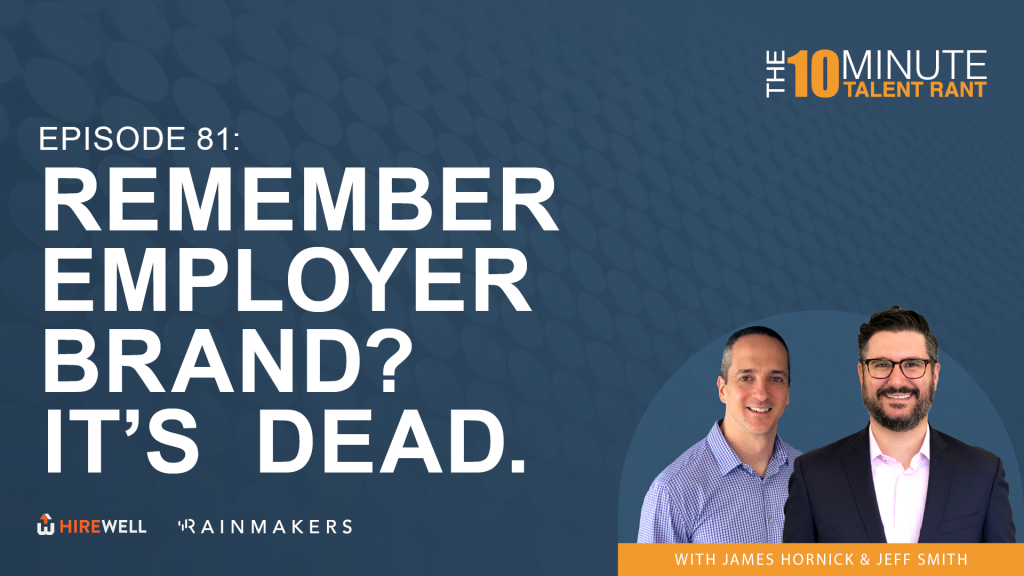The 10 Minute Talent Rant is live. I’m James Hornick joined by Jeff Smith and we are on the clock. The 10 Minute Talent Rant is our ongoing series where we break down things that are broken in the talent acquisition and hiring space, and maybe even pitch a solution or two. Before we dig in, all our content can be found at talentinsights.hirewell.com.
So you can check this replay later if you miss it and the podcast channel. So this week’s topic: unlimited PTO is a scam. So good conversation. We actually did- we collected some data and did a poll on this one because I want to find out people who have unlimited PTO, how much time they actually take off.
We’ll get into that later. One thing we did not talk in our kind of pre-show kind of promotion for this is like Jeff has a long background in this area and to get everyone in the right context and kind of how we got here with time off, Jeff’s going to give us a short intro in terms of the history of how time off has evolved into the current state.
So Jeff take it away. Yeah. I mean, defining the old model versus the new model is super important. So like, if you think about the old model, it’s vacation plus sick and both like went into banks, right? They were accrued at a set amount for vacation time, typically two to three weeks. I mean, it was very rare for it to be anything over that and that accrual
rolled over by and large from year over year. There were some caveats, but that was the general parlance of the time. Sick time was also accrued separately and it ranged from anywhere from one to five days a year. So there’s your old model. New model, unlimited PTO, the soup dejour, take time when you need it.
You’re sick, take the time off. The unapproved PTO model kind of blew up in, you know, as I was coming out of school and it was definitely something that was pitched kind of over and over as I was looking for my first couple jobs. I think that’s become a prevailing policy in corporate America ever since.
So I think about it this way, in the first instance, like vacation was protected. The vacation banks had to be like- first of all, they had to be liquid. They had to be paid out cause or no cause so there was no limit to the amount of or the amount of cash that you could kind of surplus in those banks.
When you say liquid, you mean companies had to have cash on hand for every employee in every amount accrued sitting there in the banks, an actual bank somewhere in case the entire company quit tomorrow? Great point. Yeah. That’s exactly what I’m saying. So those banks that had accrued, the company literally was on the hook that if every employee quit the next day, they had to pay all of that out within
I think it was 30 or 45 days. I don’t know exactly what the legislation was. I remember specifically my mom getting paid out for like eight months of vacation after she quit- her longest standing job. I was like man, that sounds pretty cool. And that’s because there was no roll over. No one’s banking anymore.
So right now PTO works the same as vacation, but like unlimited time just doesn’t accrue by and large any longer. So I think there’s your two distinctions. Okay. So I want to talk about- when we talk about unlimited PTO being a scam, there are a couple kinds of caveats we need to put into this.
So there’s design and execution. So actually how these programs are set up and then how they’re actually executed by companies. I need to be very upfront, not every company that’s using this policy is scamming their employees. And that was one of points of contention that I had and a little bit of a debate we had online. There are places that have mindful proper execution of this.
We’ll come back to that later at the end. We talked about kind of our fixes and everything. The design of unlimited PTO has two aspects. So one, the financial savings that Jeff outlined. Now here’s the thing. I don’t have an issue with the liquidity requirements, which drove all this. It’s actually nonsense that a company that has thousands of employees should have to have a dollar in the bank for every single day off that someone could potentially take in case the entire company leaves tomorrow.
That’s an incredible amount of capital getting tied up, and it was a silly rule. And that’s what obviously mostly drove all this. It does on the other aspects, you’re also at the same time no longer paying out employees for any sort of accrual because unlimited time off does not accrue. So that kind of sucks for employees.
But the other side of it though, is you have to realize that people don’t actually take more time off during unlimited PTO plans. And I’m going to actually come to some data we collected about this. By definition alone, that’s why I say by calling it unlimited PTO, that is what I- it’s an outright lie.
It’s not unlimited. There are limits you have on the amount of PTO you can take, which is the main issue I have with the entire thing as a branding and advertising point to potential hires and employees. I have deadlines. I have responsibilities. I have approval processes. So do you, so does the majority of everybody that’s listening to this, like work is work.
It’s a misnomer and a misleading misnomer that makes it sound way cooler than it is and people- anyway. So tell us about the data. All right. So survey, this is a very easy one. I don’t think- I actually am pro LinkedIn polls only because I think they actually know how to structure a question properly.
You actually can get good data. So question we put out there, if you are on an unlimited PTO plan, how much vacation time do you actually take? First one answer we gave was I’m not on the limited because you have to get people on social media, something to click on. So we had 7,002 and people respond only 4,500 were on unlimited PTO plans. Of those, under three weeks, three to five weeks, five weeks or more. 44.9% of people were under three weeks, which is not very much. That’s bare minimum time off.
So nearly half of people on unlimited PTO plans are still taking three weeks or less. 43.6 people percent of people, three to five weeks. So that’s reasonable amount. So another 43.6 people like earn that three to five range. Okay, I can get behind it. Only 11 and a half percent of people were over five weeks where you’re totally killing it
taking lots of like what I would consider unlimited time off. So those are the numbers. You know, 45, 45, roughly in 10, in terms of like under three, three to five and five weeks. There was also a lot of the data out there. So Glassdoor has some data, 61% of employees admit to working at some point during their paid time off days.
So no matter what, I hate the term unlimited because as a selling point to job seekers, again, you have to keep the labor in this because it’s intentionally misleading. And it sounds like you’re getting this amazing benefit but really you’re not getting much more than anyone ever really got before. And like a lot of these people aren’t getting very much vacation and you’re also not getting it accrued
To get any off. That being said, let’s discuss the other side. Yeah. I mean, a lot of companies use the policy with like a pro employee focus and it kind of looks like exactly the situation that we ran into in the comment section, right? I know you wanted to give Charlie a shout out, so go ahead.
Yeah. So execution and these are also kind of the fixes for the week. Charlie Judy, he’s the CHRO at intelligent medical objects- great company. His entire company backed them up that they have this policy but it’s great and they love it. So there are places doing. Yeah, it’s great. They’re doing it well, but let’s cover some of these things.
We’ve got nine suggestions we have if you’re running unlimited PTO, what you should actually be doing to run it in a reasonable way. So Jeff, go ahead. Kick it off. Minimum time off policies are something that I’m starting to hear more about. I like it. I like the idea that you’re making sure that folks aren’t peer pressured into working more.
I mean, I don’t know what that number is. I think it would vary from company to company, but setting an expectation that you at a minimum have to take 10 business days off a year is, it’s not going to be the end of the world- that’s for sure. I like the idea if it’s done right of no questions asked policies, as long as it’s X amount of days in advance or you’ve sent
some sort of approval process within an appropriate timeframe, there’s no manager, no higher up can say “No, you can’t do that.” Flexible work schedules are really intriguing. Like people are working 10, 12 hour days anyways. Like there’s a world where four days get stuff done. You log on for a few hours on Friday and you’re done with it.
The holiday season, I think that that incentive to have some preloaded afforded time off between that Christmas time and new year’s time is a place where nobody’s really working anyways, like let’s give as many of these folks time off possible. Yeah. There’s some benefits platforms out there and the E Vives does this when they ping you about whatever your benefits are, make sure you’re using them including time off.
So there’s ways to remind people to take time off. Clear Cover in Chicago, they just announced a four day work week over the course of the summer. Just a lot of good things the company is doing out there. Yeah. Sick days, encourage people to stay home when they’re sick. Like remember coronavirus? That happened.
I mean, if you’re still going to be going into the office, let’s incentivize people to not come to the office when they’re sick. Also let’s start talking about mental health days. It’s not- this isn’t like a stigma anymore. Everybody just needs a break, right? Yeah. Last thing, most important thing:
stop calling it unlimited PTO. Call it flex time, whatever you want to call it just it’s so misleading. Anyways, we are short on clock. That’s a wrap. Thanks for tuning into the 10 Minute Talent Rant, part of the Talent Insights series, which is always available for replay on talentinsights.hirewell.com. Jeff, thanks again! Everyone out there, we’ll see you soon.








